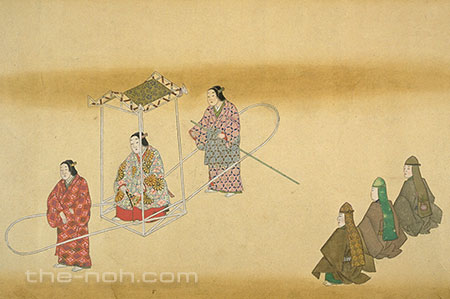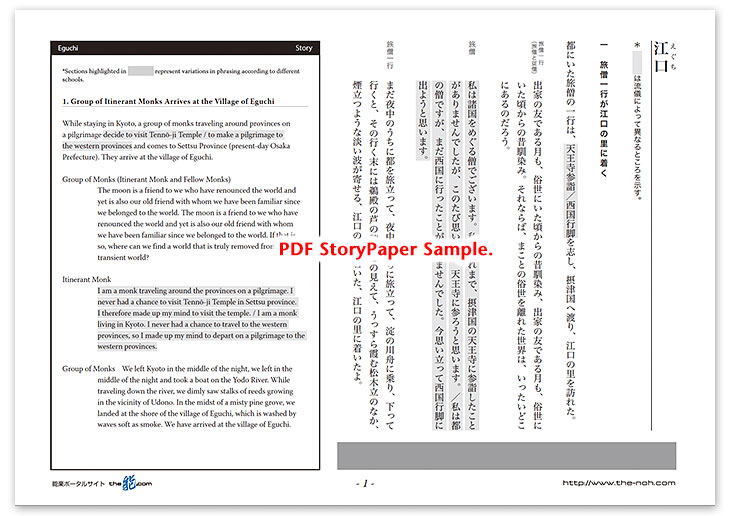
 Eguchi
Eguchi

![]()
While staying in Kyoto, a group of itinerant monks traveling around the provinces on a pilgrimage decide to visit Tennō-ji Temple in Settsu Province (in Osaka Prefecture present-day) [to go on a pilgrimage to the western provinces], and set out on their journey. They travel down the Yodo River on a boat and stop at the village of Eguchi. The village used to have a number of brothels and is well-known for the story of Eguchi-no-kimi (Madam Eguchi), the mistress of the brothel district, who declined a request from Monk Saigyō, when he was looking for a place to stay for the night. Advised by a villager about a historic place associated with Madam Eguchi, the itinerant monk becomes immersed in deep emotions while looking at the place and recites Monk Saigyō’s poem: “To renounce the world is difficult, / But to deny a monk a night's lodging is far easier / For a heartless woman to do.” Then, a woman who has heard the poem recited comes to talk to the monk. She recites the reply poem that Madam Eguchi sent to Monk Saigyō, explaining that she did not mean to reject Saigyō’s request but rather, she was trying to be considerate of Saigyō, by refraining from offering lodging at a brothel to him—a man who had entered the priesthood. Furthermore, she tells the monk not to pay attention to such stories about worldly matters because he has also renounced the world. When the monk asks who she is, she reveals that she is the ghost of Madam Eguchi and vanishes.
The monk once again asks the villager about Madam Eguchi. The villager tells him the story of Shōkū Shōnin (Monk Shōkū) having received, in a dream, an oracle that Madam Eguchi was a reincarnation of bodhisattva Universal Sage. The villager encourages the monk to perform a memorial service for Madam Eguchi.
In the middle of the night, while the monk is preforming a memorial service for Madam Eguchi, her ghost appears on a pleasure boat, accompanied by the ghosts of two of her attendants. After showing the scene of enjoying themselves on the gorgeous boat, Madam Eguchi expounds the Buddhist teachings of karmic reward and the principle of impermanence and performs a dance. Then, she explains that we will reach enlightenment once we let go of our attachments, and is transformed into the bodhisattva Universal Sage. The pleasure boat she is riding in is also transformed into a white elephant (the mount of bodhisattva Universal Sage). The bodhisattva mounted on the elephant rides on a white cloud and flies away to the west.
![]()
Eguchi village exists in present-day Higashi Yodogawa Ward, Osaka. The origin of the name is “Naniwa-e no kuchi (the mouth of Naniwa Bay).” The village was located at the junction of the Yodo and Kanzaki rivers and flourished as a hub of water traffic since ancient times. In the Heian period (late 8th to late 12th century), many pilgrims traveling to Kumano, Mount Kōya, and Shitennō-ji Temple stopped by this village. As a number of nobles from Kyoto visited the village of Eguchi, it is assumed that high-end brothels operated in the village. Because they offered services to noblemen, courtesans working in Eguchi were educated and knew how to compose poems. Some noble ladies who were financially ruined probably ended up as courtesans in Eguchi.
Madam Eguchi was a brothel mistress in the village of Eguchi. There are several stories about her, such as the episodes in which she exchanged poems with Monk Saigyō regarding his request for overnight lodging. In another story, Monk Shōkū came to see her because it was revealed to him in a dream that she is an incarnation of the bodhisattva Universal Sage. The inclusion of these episodes in this Noh piece enriches its storyline.
The highlight of this play, “Eguchi,” comes the second half of the drama when courtesans enjoy boating. Madam Eguchi and two retainers appear on the stage in a boat, which is quite impressive. Like a fragile dream that disappears in an instant, they enjoy a night of boating on the Eguchi shore, which is surrounded by rivers. While the drama depicts such moments of pleasure, it also describes the severity of karmic reward and the impermanence of this world. Although Madam Eguchi is a courtesan engaged in the most worldly of worldly professions, she is also an incarnation of the bodhisattva Universal Sage. Madam Eguchi vividly embodies the dazzling brilliance, effervescence, and fleeting nature of this world and yet she also shows that etched deep within it lies, the light of profound truth, imbuing this play with profound meaning. The dances are elegant and beautiful not merely for their own sake, as they also draw the audience into the world of profundities that they can enjoy pondering in the lingering atmosphere.
The last section of Eguchi touches upon core principles of the Buddha’s teaching and therefore is often chanted at wakes, funerals and memorial services to console the soul of the deceased.
STORY PAPER : Eguchi
Story Paper presents noh chant stories in modern speech, with story outlines, highlights and more using Adobe PDF format, which can print out and zoom in. Print out the pages and take them with you when you see the actual noh performance.

The copyright of Story Paper is held by the Noh.com. Story Paper is for individual use only. It is prohibited by the copyright law to distribute or publish printed-out Story Paper pages without prior consent. For more information, check the credit and disclaimer pages.



 [Eguchi : Story Paper PDF : 578KB
[Eguchi : Story Paper PDF : 578KB